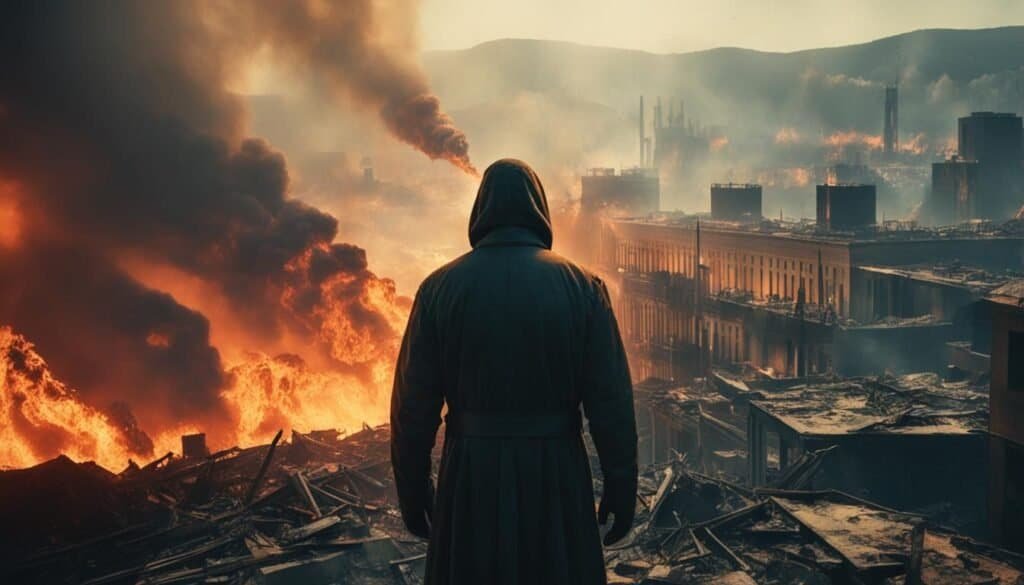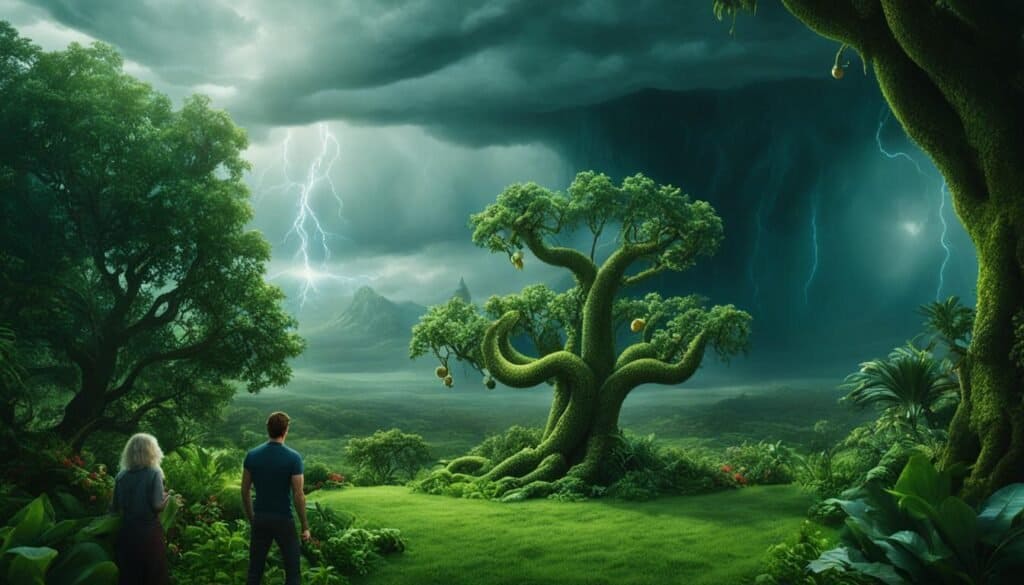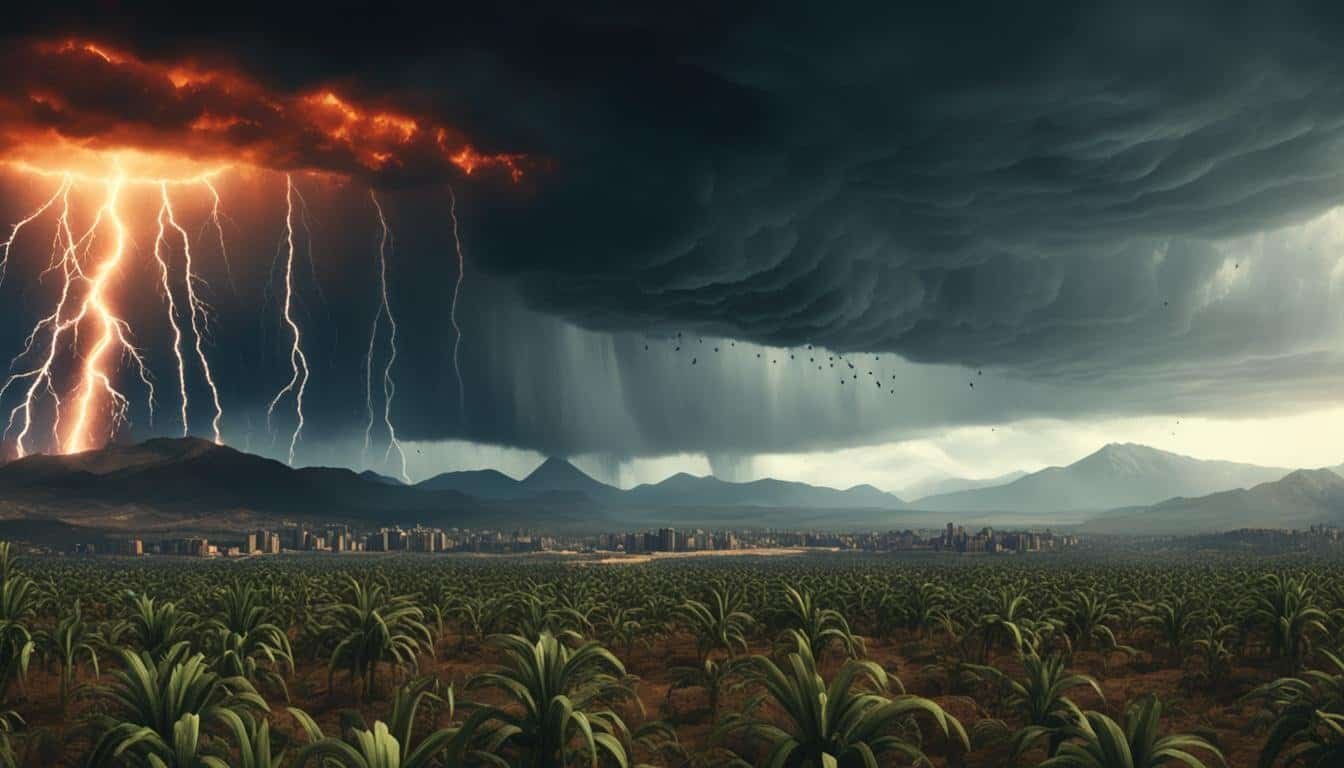Have you ever thought about the big events that changed our world? The book of Genesis in the Bible tells us about major disasters and judgements. These events have influenced our past and present in deep ways. Let’s explore these stories and see what they teach us.
Key Takeaways:
- The book of Genesis shows how big disasters and judgements have steered human history.
- The Great Flood flooded the Earth, but Noah and his family were saved on a huge boat.
- The Garden of Eden’s banishment brought hard work and difficulty to humankind.
- The Tower of Babel changed the world by splitting people into groups with different languages and cultures.
- Cain’s murder of Abel started human violence, showing the darkness people can choose.
The Great Flood: The Most Iconic Disaster
The Great Flood is one of the most iconic events from the book of Genesis. It happened in chapters 6 to 9 and changed human history. This flood story with Noah’s ark shows how our actions matter and mercy can be found in tough times.
God saw humanity was full of corruption and decided to flood the earth, as written in Genesis 6-9. Noah, a just man, was chosen to save himself, his family, and pairs of all animal kinds by building an ark. This was God’s way of sparing the good from the harsh flood that was to come.
It rained for forty days and nights, covering the earth in water. Everything not in the ark was swept away. The ark was Noah’s safe haven, built according to God’s plan to survive the flood.
“And all flesh died that moved on the earth: birds and cattle and beasts and every creeping thing that creeps on the earth, and every man. All in whose nostrils was the breath of the spirit of life, all that was on the dry land, died.”
– Genesis 7:21-22
The Great Flood changed the world, showing God’s judgment and the chance for a new beginning. When the waters went down, Noah’s family started over. God’s covenant was shown by a rainbow, a symbol of hope after the flood.
The Great Flood tale invites us to think about our choices and their effects. It is a story about being good, listening to God, and His mercy during hard times. This story is not just a warning but also about hope and faith that lead us through troubles.
The Garden of Eden’s Curse
After Adam and Eve disobeyed God in the Garden of Eden, they were kicked out. This led to hardships and having to work hard. The impact of their actions continued through history and influenced all of humanity.
The Garden of Eden was originally perfect, a place of harmony and abundance. They had a close relationship with God. But, the serpent tricked them into eating from the forbidden tree. This broke their relationship with God and brought sin into the world.
“Cursed is the ground for your sake; in toil you shall eat of it all the days of your life. Both thorns and thistles it shall bring forth for you, and you shall eat the herb of the field. In the sweat of your face you shall eat bread till you return to the ground.”
This curse made hard work necessary for survival. Life was no longer easy. Adam and Eve lost their direct connection to God and faced a tough world alone.
The curse affected not just Adam and Eve but all their descendants. Every generation faced the consequences of their sin. This included hardship, pain, and the fight to live.
The curse from Eden is seen in the problems we still face today. It shows in our broken relationships and the presence of evil. Yet, the story offers hope through Jesus Christ, who brings redemption.
Lessons from the Garden
Thinking about this curse reminds us to stay obedient. It shows how our choices affect everyone. We learn to stay close to God and make choices that honor Him.
We’re urged to be smart and say no to wrong things. With God’s help, we can get better despite the curse’s effects.
The story of Eden is important for understanding weakness, temptation, and God’s goodness.
The Tower of Babel
In the ancient city of Babel, people tried to build a tower to heaven. They wanted to show their greatness. But God stopped them, changing their lives forever.
God saw their attempt and decided to do something different. He scattered the people all over and gave them different languages. Now, they couldn’t work together like before.
This is how the world got so many different cultures and languages. It is because of God’s plan after the Tower of Babel.
“And the LORD said, ‘Indeed the people are one and they all have one language, and this is what they begin to do; now nothing that they propose to do will be withheld from them. Come, let Us go down and there confuse their language, that they may not understand one another’s speech.'” – Genesis 11:6-7
The Tower of Babel story helps us understand human history. It shows God’s role in changing our path together.

Impact of the Tower of Babel
The Tower’s effect was huge. People couldn’t understand each other anymore. This led to different languages and cultures all over the world.
Now, we have many languages and ways of life because of what happened at the Tower of Babel. Think of how this has enriched our world since then.
The Symbolism of the Tower of Babel
More than just history, the Tower of Babel is a lesson we should learn from today. It shows the danger of too much pride and the importance of working together humbly.
The tower’s fall warns us of the consequences of not respecting and helping each other in our common goals.
Impact of the Tower of Babel
| Impact | Description |
|---|---|
| Linguistic Diversity | The Tower of Babel led to the emergence of different languages, enhancing cultural diversity worldwide. |
| Cultural Variation | The scattering of humanity resulted in the formation of varied cultures, each with its own customs, traditions, and artistic expressions. |
| Communication Barriers | The introduction of different languages hindered communication and necessitated the development of interpretation and translation skills. |
| Collaboration Challenges | The Tower of Babel disrupted the unity and coordination among humans, creating challenges for collaborative endeavors. |
Cain Murders Abel
A chilling incident changed the world’s history early on. It was the first murder ever recorded. Cain, Adam and Eve’s first son, was the culprit. This violent act introduced death and violence to the world.
In Genesis, chapter 4, we find the story of Cain and Abel. The brothers both offered sacrifices to God, but only Abel’s was accepted. This made Cain very jealous. His jealousy turned to rage, and he killed his brother.
“Then the LORD said to Cain, ‘Where is Abel your brother?’ He said, ‘I do not know; am I my brother’s keeper?’ And the LORD said, ‘What have you done? The voice of your brother’s blood is crying to me from the ground.'”
This act of violence changed everything for the first family. God’s reaction shows how serious Cain’s sin was. His violence and jealousy ended the peace they all knew.
Consequences and Reflection
This story is a stark reminder of how evil we can be. It shows the terrible outcome of jealousy and anger.
We should think carefully about what happened. It reminds us to watch out for bad feelings in our own hearts. We should seek forgiveness, make peace, and stop destructive emotions.
Sodom and Gomorrah’s Destruction
Sodom and Gomorrah were known for their wicked ways. They faced a terrible fate because of this. Genesis 19 tells us these cities were destroyed by God’s judgment, using fire and brimstone.
“Then the Lord rained down burning sulfur on Sodom and Gomorrah — from the Lord out of the heavens. Thus, he overthrew those cities and the entire plain, destroying all those living in the cities — and also the vegetation in the land.” —Genesis 19:24-25
The tale of Sodom and Gomorrah is a strong warning. It shows how wickedness brings severe consequences. God’s use of fire and brimstone highlights his power and perfect nature. This is all about his just judgment against those who do evil.
Over time, the story of these cities has warned many. It tells us not to ignore God’s rules and live in a bad way.

The lessons from Sodom and Gomorrah urge us to review our lives. We should aim to follow God’s ways. Even though the cities were destroyed, it shows God values what’s right and fair.
| Key Points | Implications |
|---|---|
| Sodom and Gomorrah’s wickedness | The cities were engulfed in fire and brimstone as a result of their immorality. |
| God’s judgment | The destruction serves as a powerful example of God’s demand for righteousness. |
| A warning for humanity | The account serves as a reminder of the consequences of turning away from God’s commands. |
The Fall of Man
In the Garden of Eden, Adam and Eve did a very important thing. They went against what God wanted. This action messed up the perfect connection between humans and their Creator. According to the book of Genesis 3, they were tricked by a serpent. This evil deed caused a lot of trouble, even though God warned them not to eat from a certain tree.
This moment, called the Fall of Man, brought sin into the world. It really changed how people and God got along. Before they sinned, Adam and Eve were super close to God. They did not know what sin was like.
But then, they decided to do the wrong thing. This broke the goodness between them and God.
“And the Lord God commanded the man, saying, ‘Of every tree of the garden you may freely eat; but of the tree of the knowledge of good and evil you shall not eat, for in the day that you eat of it you shall surely die.'” – Genesis 2:16-17
The effects of their choice were huge. It was not just about them. Their mistake led all of us to have a tendency to do wrong. It also put a barrier between us and God.
It also meant life would be harder for people. Adam had to work really hard to get food. Eve would feel a lot of pain when having children. These things remind us of the trouble their mistake caused.
So, the Fall of Man is like a lesson. It shows us what happens when we choose to go against God. It’s not good. But, it also tells us about God’s love. He found a way to fix things through Jesus Christ.

| Consequences of the Fall of Man | Verse Reference |
|---|---|
| Sin entered the world | Genesis 3:6-7 |
| Separation from God | Genesis 3:23-24 |
| Physical toil and hardship | Genesis 3:17-19 |
| Pain in childbirth | Genesis 3:16 |
The Expulsion from the Garden
Adam and Eve’s disobedience in the Garden of Eden led to a heavy loss for humanity. They were thrown out of God’s paradise in Genesis 3. This event changed the path of human history forever.
The Garden was a place of perfect beauty, filled with greenery and fruits. Adam and Eve enjoyed close communion with their Creator. But, eating from the forbidden tree introduced sin into the world.

“Then the Lord God said, ‘Behold, the man has become like one of Us, knowing good and evil; and now, he might stretch out his hand, and take also from the tree of life, and eat, and live forever.’ Therefore the Lord God sent him out from the Garden of Eden, to cultivate the ground from which he was taken. So He drove the man out; and at the east of the Garden of Eden, He stationed the cherubim and the flaming sword which turned every direction to guard the way to the tree of life.” – Genesis 3:22-24
The expulsion signified more than leaving a place. It was a cut-off from God’s perfect presence. Without this, Adam and Eve couldn’t enjoy their close relationship with the Creator. They faced a world with suffering, hard work, and the battle against sin.
In this judgment, God showed His mercy and love. He stopped them from eating from the tree of life. This prevented an eternal life filled with sin. Instead, it gave humanity a chance for redemption and to be made right again.
We can learn from the expulsion from the Garden. It shows us the results of disobedience and the need to follow God’s ways. It also highlights the ongoing journey back to a right relationship with our Creator.
The Curse of Canaan
Noah’s curse on Canaan’s family has had a big impact over time. It all started because Canaan’s father, Ham, did something disrespectful. This curse, from the bible in Genesis 9, changed the lives of many people through the years.
“Cursed be Canaan; the lowest of slaves shall he be to his brothers.”
The Curse of Canaan shows how important it is to respect our families. It reminds us that what we do can affect not just us but many others who come after us.
The curse’s meaning has been talked about a lot. Some think it meant Canaan’s children would be ruled by others. Others think it’s a symbol of a deeper kind of slavery.
But, no matter the view, this Curse remains a strong lesson in the Bible about actions and their results. It teaches us about the lasting effects of not respecting our families and others.
The Curse of Canaan in Historical Context
In the past, curses like Canaan’s were seen as serious and very important. Canaan’s descendants, the Canaanites, played a big part in the Bible. The land they lived in was later promised to the Israelites.
Some have said that Noah’s curse explains why the Canaanites lost their land. They say it’s a key part of the Israelites’ history.
The Curse of Canaan: A Legacy of Debate
People still talk about what the Curse of Canaan really means. Some see it as a reason for the Israelites’ actions against the Canaanites. Others see deeper meanings in it.
It’s good to have these talks to really understand this part of the Bible. They help us see just how rich and complex its stories are. They also bring up important questions about what’s right and just.
| Key Points | Implications |
|---|---|
| Noah’s curse on Canaan | Shaped the social and cultural dynamics of future generations |
| Disrespectful actions of Canaan’s father, Ham | Triggered the curse and served as a cautionary tale |
| Debate and interpretations | Highlight the complexity and significance of the curse |
| Historical and spiritual implications | Link the curse to the conquest of the land of Canaan and Israelite history |
The Mark of Cain
Cain killed his brother Abel in an awful act. After, he faced big troubles as punishment. God marked Cain to show everyone his sin’s serious results. This mark warned others about the high cost of doing wrong.
The story of Cain and Abel tells us about the dangers of being jealous and angry. Cain’s jealousy turned into murder, breaking peace and bringing violence into the world.
“And Cain talked with Abel his brother: and it came to pass, when they were in the field, that Cain rose up against Abel his brother, and slew him.” – Genesis 4:8
God dealt with Cain after the murder and gave him a strict punishment. The mark was both a physical sign and a symbol of his guilt. It set him apart as a reminder of his wrongdoing.
This mark serves as a warning that our actions have big effects. It tells us to choose wisely and live rightly, to avoid tragic outcomes caused by our choices.
Lessons from the Mark
The Mark of Cain teaches us some key lessons. It shows that some actions cannot be reversed. Once done, they leave a permanent scar on our souls.
This mark also highlights personal responsibility. We must answer for what we do and accept the consequences. Cain’s brand reminded him of the harm he caused every day.
Finally, this mark warns us against the dangers of violence. It encourages us to solve problems with peace and seek forgiveness always.
The Mark of Cain: Reflections
When looking at the mark of Cain, think about your own impact on the world. Do you spread peace and make good choices? How you act and treat others matters a lot.
It also shows that forgiveness is powerful. Despite Cain’s crime, he had a chance to turn back to God. This mercy shows God’s endless love and care for us all.
Remember the mark of Cain in life’s hard times. Choose to do what’s right, take responsibility, and work for peace. Make the world better with your actions and choices.
The Great Famine
A severe famine hit Canaan hard. It forced Abraham and his family to Egypt for food. This famine tested both their faith and their personal endurance.
In Genesis 12, Abraham followed God’s command. God told him, “Go from your country and your kindred and your father’s house to the land that I will show you. I will make of you a great nation, and I will bless you and make your name great, so that you will be a blessing.” (Genesis 12:1-2)
Abraham set off, trusting in God. But then, they reached a struggling point—the Great Famine. This major event made them leave their promised home to find food elsewhere.
Abraham and his family faced hard choices. They left their dream to live somewhere else, like Egypt, for a while.
In tough times, Abraham kept his faith strong. He believed God’s promises would come true, even in Egypt. This faith was a key part of his character.
The Great Famine story teaches us about struggles in our faith journey. It shows how we must trust God’s time and ways, even when life is hard. Abraham’s faith led him back to the promised land. This illustrates that trusting in God can see us through tough times too.
Abraham’s Promised Land and the Great Famine
In Genesis 12, Abraham received a promise from God for a special land. This promise showed Abraham God’s love and faithfulness. The land symbolized a future of plenty and safety for his family.
The Great Famine complicated their journey to this land of promise. This challenge pushed Abraham to Egypt for a while.
The Famine reminds us of faith’s tough tests. In such times, our job is to keep believing in God’s plan. Like Abraham, we also need to keep our trust strong during hard times.
| Key Points | The Great Famine |
|---|---|
| 1. | Abraham met the Great Famine on his way to Canaan. |
| 2. | The lack of food and resources made him move to Egypt for a bit. |
| 3. | This event tested Abraham’s faith and strength. |
| 4. | Still, Abraham showed he completely trusted in God’s care and direction. |
| 5. | The Great Famine story underlines faith in God’s promises during hard times. |
Sarah and Hagar’s Conflict
In Genesis 16 and 21, we see Sarah and Hagar’s tough relationship. They were both married to Abraham. This conflict changed the future of the area and Abraham’s family line.
Sarah couldn’t have children herself, so she suggested Abraham have a child with her maid, Hagar. This caused big problems. When Hagar got pregnant, Sarah felt jealous and started treating Hagar badly.
“My oppression be on you! I gave my servant to your embrace, and when she saw that she had conceived, she looked on me with contempt.” (Genesis 16:5)
Hagar didn’t want to deal with the mistreatment. She ran away. But an angel told her to go back to Sarah. The angel also said her child, Ishmael, would be the father of a great nation.
Then, Sarah herself had a baby, Isaac. This made things even harder with Hagar. Sarah was afraid Ishmael might take Isaac’s place.
“Cast out this slave woman with her son, for the son of this slave woman shall not be heir with my son Isaac.” (Genesis 21:10)
So, Abraham had a tough choice between his two wives. He ended up doing what Sarah asked and sent Hagar and Ishmael away. This sad event changed everything. Ishmael would later lead the Arab nations.
The story of Sarah and Hagar shows how complicated family can be. It explores power and the impact of our choices. It also reminds us that even important people in the Bible went through hard times with their families.
Sarah and Hagar’s Conflict Table
| Key Elements | Genesis 16 | Genesis 21 |
|---|---|---|
| Sarah’s inability to conceive | ✓ | ✓ |
| Sarah’s suggestion for Abraham to father a child with Hagar | ✓ | |
| Tensions and mistreatment between Sarah and Hagar | ✓ | ✓ |
| Hagar’s flight into the wilderness | ✓ | |
| Angel’s guidance to Hagar | ✓ | |
| Sarah’s jealousy and demand for Hagar and Ishmael’s expulsion | ✓ | |
| Abraham’s conflicted decision | ✓ | |
| Hagar and Ishmael’s expulsion | ✓ |
Joseph Sold into Slavery
In Genesis 37, we meet Joseph, a young man betrayed by his brothers. His father’s love for him sparks jealousy. This leads Joseph’s siblings to sell him into slavery.
Joseph loses everything and everyone dear to him. He finds himself in a world where he is a servant. But, he doesn’t lose faith in God and remains strong during tough times.
Joseph’s story is about power, redemption, and life’s surprises. He goes from a slave to a leader in Egypt, showing us the power of sticking it out and having faith in hard times.
Joseph’s story teaches us the profound impact of betrayal. And how forgiveness and faith in God can help us win against tough odds.
We explore Joseph’s life in Genesis 37. We look at how being sold into slavery affects him and his family. Then, how things change for the better, bringing the family back together.
A Complex Journey of Betrayal and Redemption
Next, we see Joseph’s amazing journey. He goes from being sold, to a powerful position in Egypt. Through it, we learn about resilience, forgiveness, and the wisdom of God’s plan.
Joseph’s Brothers: A Catalyst for Change
Joseph’s brothers’ jealousy changed his life’s course. Their actions landed him in slavery, which made Joseph strong. This began his journey towards great things.
| Key Themes | Implications |
|---|---|
| Betrayal | Joseph’s brothers’ actions show us how jealousy can harm others. |
| Redemption | Joseph’s success after hardship proves that second chances are powerful. |
| Divine Providence | The events in Joseph’s life reveal God’s plan and the fulfillment of old predictions. |
The Ten Plagues of Egypt
The Ten Plagues were God’s way of getting the Israelites out of Egypt. They can be found in Exodus 7-11. Each plague showed God’s power and his aim to free His people from being slaves.
The first plague turned the Nile into blood and killed the fish. Then came plagues like frogs, gnats, and flies. Livestock got a disease, which made Egypt suffer a lot.
Even after all this, Pharaoh still said no to letting the Israelites go. So, God sent even worse plagues. These included things like boils, hail with fire, locusts, darkness, and the death of firstborn children.
After the last plague, Pharaoh finally agreed to let them go. The Ten Plagues showed God’s fairness and power. They also show that God keeps His promises and that good will always win.
These events were key in showing the power of God to both the Egyptians and Israelites. They led to the belief that God really could bring big changes.
Affiliate Disclosure: "As an Amazon Associate I earn from qualifying purchases made from links in this post. We are a participant in the Amazon Services LLC Associates Program, an affiliate advertising program designed to provide a means for us to earn fees by linking to Amazon.com."

